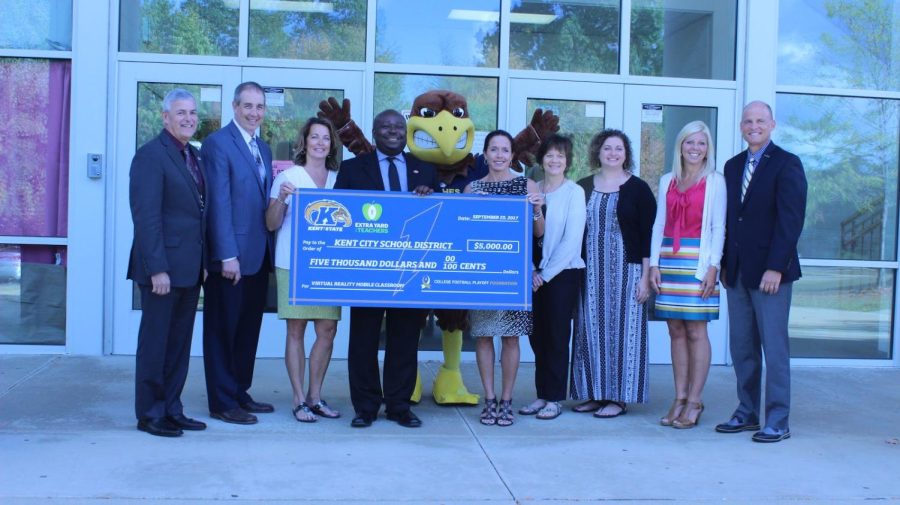Kent City Schools to create virtual reality ‘Magic School Bus’
Kent State and Kent City Schools employees, including Kent City Schools superintendent George Joseph (left) and Kent State Director of Athletics Joel Nielsen (right), pose with the $5,000 grant check for an upcoming virtual reality project.
September 28, 2017
Kent City Schools students will soon ride a bus to see the wonders of the world — without ever leaving Portage County. It sounds like an episode of “The Magic School Bus.”
The district plans to install virtual reality equipment in a refurbished bus that will travel between buildings. The initiative is still in the planning stage, but it received a big boost Thursday when the district was presented a $5,000 grant toward the project.
The grant, roughly one-third of the initiative’s total cost, will help offset the cost of virtual reality setup. Along with equipment, the district must refurbish the school bus to serve as a mobile classroom.
The Kent State athletic department presented the grant on behalf of the College Football Playoff Foundation, which awards schools money to inspire and empower teachers.
Joel Nielsen, the Kent State director of athletics, presented the ceremonial check alongside George Joseph, the Kent City Schools superintendent, and several district and university employees.
“This is the first time (the foundation) reached out and actually offered cash value for the institutions to award to their local school districts,” Nielsen said. “We’ve worked with Kent City Schools, I know for the eight years I’ve been here. Our relationship is quite strong, so it was natural for us to reach out to the school district when this program was presented to us.”
Kent City Schools has used virtual reality as a learning tool before, but Christine Goff, a Davey Elementary fifth-grade teacher, said the mobile classroom will improve students’ access.
“What I have right now are Google Cardboards,” Goff said. “I only have four that I use for a class of 20,” she said. “(Having the bus) gets every student engaged for a whole class discussion instead of doing small mini-groups.”
Google Cardboards are small, inexpensive headsets that use lenses and a smartphone to create the illusion of being in another location. The district purchased a Google Expeditions kit for the mobile classroom.
The kit is a complete classroom setup that includes everything teachers need to take 30 students on virtual reality field trips.
“It’s like you’re on top of Mount Fuji, and there’s a helicopter landing behind you,” Joseph said, describing one possible virtual reality field trip. “You turn around in the glasses, and you see the helicopter landing behind you on a snow-capped mountain.”
Joseph raised the possibility of collaborating with local businesses to create virtual reality experiences that will allow students to use headsets for a 360-degree view of that business.
But none of this will take place until the project is fully funded.
“We are only a few thousand dollars away from having everything pretty much done,” Joseph said. “I have several sources that I’m trying to tap.”
If all goes according to plan, Joseph said the virtual reality bus will be up and running by spring 2018.
Dylan Reynolds is the business and neighborhood reporter. Contact him at [email protected].

















